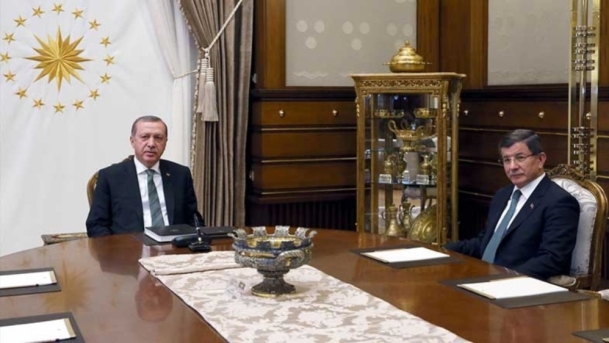
After two meetings between Turkey’s President Erdogan and Prime Minister Davutoglu in the span of less than a week, Davutoglu announced his resignation as head of government and head of the AKP party on 5 May 2016. This policy brief examines the key points of contention between Erdogan and Davutoglu, the republic’s governmental crisis, the impact of Davutoglu’s resignation on the Justice and Development (AKP) Party and the possibility of constitutional reform that will change the country’s system of governance.
Key points of contention
Ahmet Davutoglu’s resignation was not unexpected in light of recent disagreements with Turkey’s president Recep Tayyip Erdogan. However, even during his resignation speech, Davutoglu refused to insult the country’s president, stating that his own honour was directly linked to that of Erdogan’s. This policy brief argues that despite this resignation, Turkey’s government should not be described as suffering a severe crisis, and that this stage will be temporary. The policy brief outlines the clearest reasons for the now-public split between Davutoglu and Erdogan, the state’s crisis, the impact of the resignation on the AKP party and the possibility of constitutional reform in Turkey in light of the resignation.
The roots of the crisis date back to September 2015, during the run-up to the early elections. First, in preparation for leaving the party if elected president, Erdogan prepared a list of names for a new AKP Central Committee, which should have been voted on during the party’s general convention as per party rules. Davutoglu did not agree with some of the appointments, and said he would like to resign at the time, but pressure from those around him and the sensitive political climate stopped the resignation at that time and forced him to accept Erdogan’s list of names.
In November 2015, during the run-up to early elections and after the AKP lost its majority in the parliament, Erdogan directly became involved in the campaigning, with a major promise of constitutional reform that would transform Turkey from a parliamentary to a presidential system. Erdogan’s participation in the campaigning overstepped the constitutional stipulation that as president, he should not be involved in the party’s campaigning process. The platform on which he focused (presidential versus parliamentary system) further divided not only the party itself, but also made for an even more polarized political environment.
When the time came to form the government, Erdogan insisted on appointing two ministers from his side, one of them allegedly linked to corruption and the other his son-in-law, as well as denied some of the names put forth by Davutoglu. The downing of the Russian plane eventually overshadowed the problem of forming a government acceptable to all, so Davutoglu conceded to Erdogan at that time in formation of the government, to focus on the larger foreign policy issue at hand.
Finally, while most of the issues of contention between the two men were domestic in nature, the positive recognition Davutoglu received for his role in the signing of the EU-Turkey refugee deal upset Erdogan, not because of the content of the deal but rather because Davutoglu was the one who signed it rather than him. Moreover, Davutoglu was very widely and publicly hailed for his fantastic negotiating skills as well as recognized as an effective foreign policy maker as a result.
Government crisis
Turkey is not a stranger to tension between prime ministers and the president of the republic. Given the nature of the government structure, particularly after the 2007 constitutional amendment that made the president a popularly elected figure rather than one appointed by the parliament, it is expected that the two sides will continue to struggle to find a balance of power acceptable to both.
Since the start, there was an implicit understanding between Erdogan and Davutoglu that Turkey needed a strong president as well as a strong prime minister. However, it has proven difficult to implement this combination in practice, and this is exactly what has led to calls for a presidential rather than a parliamentary system in Turkey. Furthermore, regardless of who replaces Davutoglu, the way the government structure stands now, there will continue to be a governmental structure crisis until this question of an acceptable balance of power is addressed.
What comes next?
The AKP will be holding an emergency meeting of the Central Committee on 22 May led by Davutoglu, to find a replacement for himself. Highest on the list of possibilities are the ministers of defence and justice, respectively, both of which are close to Erdogan. This indicates that there is a concerted effort not only to make the transition smooth, but also to find a replacement that will be more submissive to President Erdogan.
It is not expected that Davutoglu will completely disappear from the Turkish political scene, particularly given his conciliatory resignation speech and his rich political experience and knowledge. He will continue to be a member of the parliament as well as the party, and an effective one at that.
To argue that this resignation will bring the military back into politics is an exaggeration. This is something that is far from the strategic priorities of army leaders, as well as unacceptable to the Turkish public. Internal differences in the AKP will not lead to its end, particularly given the internal problems in the other three major opposition parties.
More generally across Turkey, the question of constitutional reform will likely be answered by the fall, when the draft constitution will be presented for a vote in the parliament and subsequently a public referendum if the necessary votes can be garnered within the parliament. And if the draft (being prepared by an AKP committee) makes it to a public referendum, the question that will be answered at that time will be whether or not the crisis created by Davutoglu’s resignation will have negatively impacted the same public that gave the AKP a victory in the last round of elections.
Note: This policy brief is a summarized version of the Arabic policy brief that appeared here.